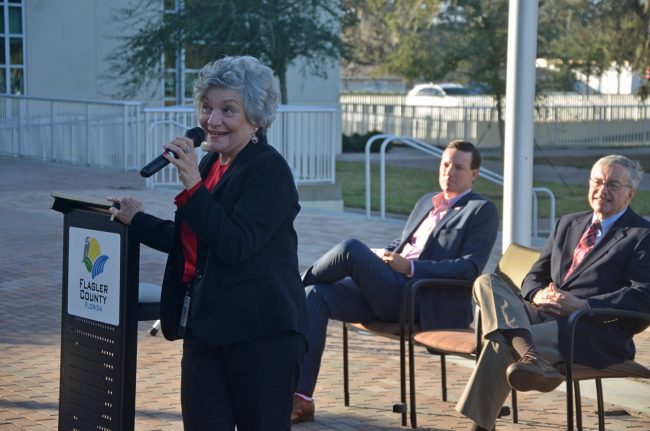
(© FlaglerLive)
The flags were at half-mast in front of the County Courthouse this afternoon—not, as it turned out, for Gail Wadsworth, whose 16-year tenure as Flagler County Clerk of Court was ending, but for John Glenn, the astronaut who died on Dec. 8 and who’d been first in space for the United States, 10 months after the Soviet’s Yuri Gagarin. In Flagler of course Glenn and Gagarin couldn’t hold a candle to Wadsworth’s name, let alone the Wadsworth name, whose collective family achievements—judges, legislators, and lately court clerk and the Republican Party’s Sun Queen—have been a political solar system all its own.
It explains why the plaza in front of the courthouse was so filled with high-octane officials in midafternoon—“more politicians in this crowd than there are normal people,” in the words of Tom Bexley, Wadsworth’s soon-to-be successor and the organizer of the ceremonial farewell to his long-time boss. It was in fact the most impressive such gathering (and possibly more impressive judging from the number of judges and lesser beings there), since the 2010 retirement of Kim C. Hammond, the judge who’d held the bench in Flagler almost since the days of King Solomon, and who gave his name to the courthouse.
So Flagler County Commissioner Nate McLaughlin could be forgiven a minor gaffe when he joked about the name on the building, as if to suggest that the county had considered changing it to Wadsworth’s, “but Judge Hammond showed up so the name’s got to stay, right?” McLaughlin said, turning to the judge sitting in the honor row behind him with a smile. “I think that’s why he showed up, just to make sure.”
Except that it wasn’t Hammond behind him. Hammond is in North Carolina. It was Judge J. David Walsh, recently retired from Flagler’s criminal bench. Hammond and Walsh share the lanky austerity of judges whose job is done, but the resemblance ends there. At any rate it was McLaughlin’s warm words for Wadsworth that were the point: “Looking around and the number of people that showed up, this is about 25 percent of the number of lives you’ve touched and affected,” he said. “Stand up and look at this crowd, would you?”
He then spoke, as several others did, to the formidable “force” Wadsworth was to local politics, Republican politics in particular.
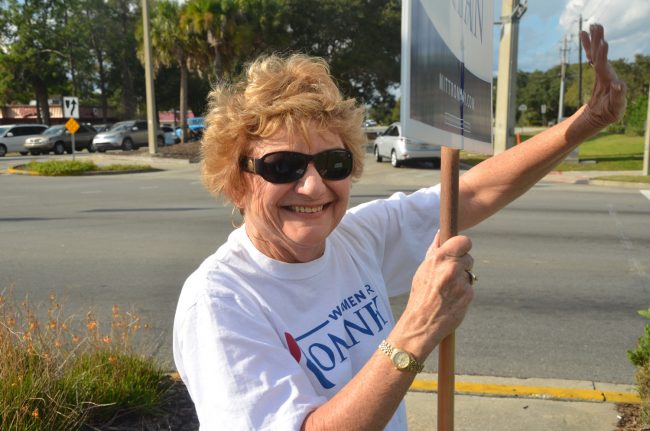
Hutson was diplomatically saying what his audience knew well: Every skeleton, every court filing, every embarrassment, every political subplot there was to know, Wadsworth knew it as few people could, given the node of information she controlled and the multi-generational history only she knew: “one of those that likes to know everything and have your finger in everything that goes on,” in State Attorney R.J. Larizza’s words.
Her genuine charm was a velvet mask of how well she could be part of those subplots. But she was also the consummate politician of a dying breed, a party boss who watched her party fracture into bitter and at times warring and uncontrollable factions unimaginable a decade ago even as the same party, at least in name, has come to monopolize Flagler politics.
A force of charms, smarts and wiles woven into generations of Flagler’s political fabric.
But Wadsworth also know the substance behind the politics, a point Rep. Paul Renner and Hutson both recognized—Renner did so soon after he was “summoned” to her office to hear a policy concern—as Hutson described it: “Some elected officials that are local stay home, others wake up, come see us and work really hard, and she did that, and she’s continuing to do that, so is her staff, and I know that whatever the next thing is you’re going to work even harder and we’re going to support you for that.”
Walsh, one of at least 10 judges attending the farewell, never spent many years in Flagler, but his professional history crisscrossed with that of the Wadsworth possibly more than anyone in that assembly, and it revealed the wealth of Wadsworth fibers weaved into Florida’s history going back at least three generations.
“When I first came to Florida,” he said, “it’s 1977, and I was in a small civil practice, and of course being the new guy, first thing I would do is handle all the cases, the hearings and things before the judges. One of the first judges I had the honor to appear before was Judge Billy Wadsworth, and Judge Wadsworth was the kind of guy that was so good with young lawyers. He would, after I’d finish giving what I thought was an excellent argument he just kind of sat back, lean back, and say, ‘Son, I think you might want the next time argue this.’ Ok. As I lost the hearing. But what a great man, a great person, really had a great effect on my life.” Walsh’s professional path then crossed path with Judge Hammond, when he had to make his way through another Wadsworth (Hammond’s judicial assistant). Gail Wadsworth’s sister Susan Roberts was a circuit judge for a long time, too.
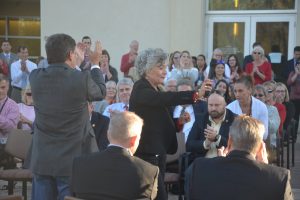
(© FlaglerLive)
Wadsworth two daughter and son, Francie Simons, Webb Shephard and Whitney Shephard Yates, spoke their tributes, describing her worth ethic, her mania for jumping out of planes (700 times was one number heard this afternoon), but also her devotion as a mother and grandmother. As others had, they intimated that her work in public isn’t done. “The community still needs you,” Shephard Yates said, “the state still needs you, and I’m sorry, you’re not done yet.”
When it came time for Wadsworth to speak, she summoned an elected official for the last time: McLaughlin, to be near her so she could grab onto him for emotional support. She did not want to cry. McLaughlin was the pinch hitter: Wadsworth is close to him, but not as close as she was to Frank Meeker, the late county commissioner who died of cancer last July in the flower of their friendship. When she spoke of how “insurmountable what some things mean to me,” she was just then referring to Bulow Ruins or Princess Place, but she’d also had that insurmountable attachment to certain people, like Meeker, whom she referred to with regret, like Bexley—who’s “hung out with me for seven years to be a great clerk”—and like her staff.
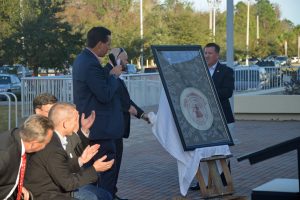
(© FlaglerLive)
Walsh had made the Oath of Retirement grandly funny. Wadsworth had sought to touch her audience with her final words. But Bexley left the warmest, most original touch for last.
It had been covered by a sheet and left leaning against an easel the whole time, lending itself to assumptions that it was a portrait, a giant plaque or another one of those corporate retirement tokens of appreciation, as big as it was cheesy.
It was none of those things. It was rather as apt and almost literal reflection and summation of Wadsworth’s 16 years. If it was possible to frame those years in the history they’d represented, the work Wadsworth had done and the name that had been engraved, if not on the courthouse façade, then on Flagler’s, Bexley had pulled it off. He had done so with the cleverest theft—a “re-appropriation,” he called it. Framed and matted with signatures as with a giant card, it was the glass pane from the door to Wadsworth’s office, with her name and seal as Clerk of Court, from the old county courthouse. A relic as there would be no other.
![]()
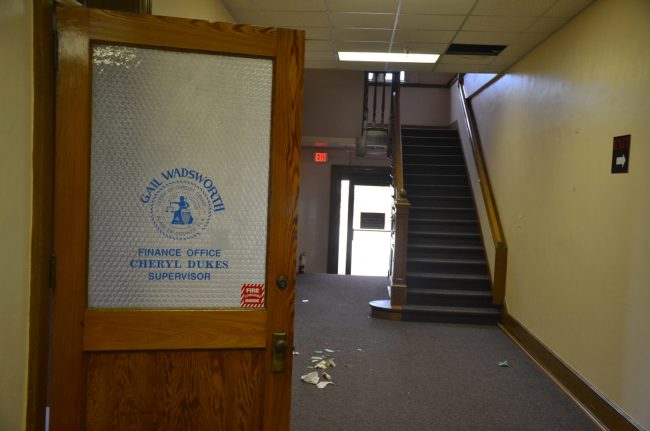





























Leave a Reply